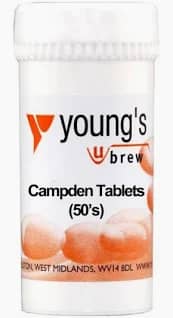If you’re using tap water to make beer, you probably need to treat it to remove Chlorine or Chloramine. Chlorine is more unstable and will gas off overnight. It’ll probably be fine, if you run your brewing water off the night before brewing and leave it overnight to use it the next day. Chloramine is a more stable form of chlorine, and won’t gas off. It’ll remain in the water, right through the process and into the final beer. You won’t find out until you taste, or smell the distinctive TCP/medicinal flavour/aroma that you hear about. This is not something you want to risk.
If your local water supplier adds chloramine to the tap water, or you forget to run your water off the night before, use Campden tablets.
Note: Chlorine and sometimes chloramine is added to your tap water to kill off bugs. This makes tap water safe to drink. You need to establish if your water supply uses chlorine and/or chloramine as a steriliser. You don’t want to take either compound through to your finished beer.
Campden tablets
Campden tablets are a compacted form of sodium metabisulfite. Campden tablets work to eliminate both free chlorine and the more stable form of chlorine, “chloramine”, from your brewing water. Not treating your brewing water can lead to TCP/medicinal (polyphenols) off flavours that are very obvious, and ruin a beer.

Treating brewing water with Campden tablets
Popular knowledge states that you can treat up to 5-gallons (23 litres) of tap water with half a Campden tablet. Simply break it in two, crush it, and add it directly to the vessel containing the tap water. I add it to the full amount of brewing water: ~33l for a 23l batch (including any RO). If you use any more tap water than stated, simply crush a full tablet and mix it in.
NOTE: Chlorine based cleaning chemicals residues left in fermenters can also lead to the production of polyphenols in your finished beer. Ensure that you properly rinse, and drain any chlorine-based cleaning solutions. Yeasts metabolise chlorine to produce polyphenols, which exhibits in the beer as that classic medicinal/TCP off-flavour and aroma.
Click to learn a simple method to measure and adjust your brewing water’s residual alkalinity. Doing this allows you to use Anglian tap water to make better pale ales and lagers.
One thought on “Basic Home Brew Water Treatment – Removing Chlorine & Chloramine”